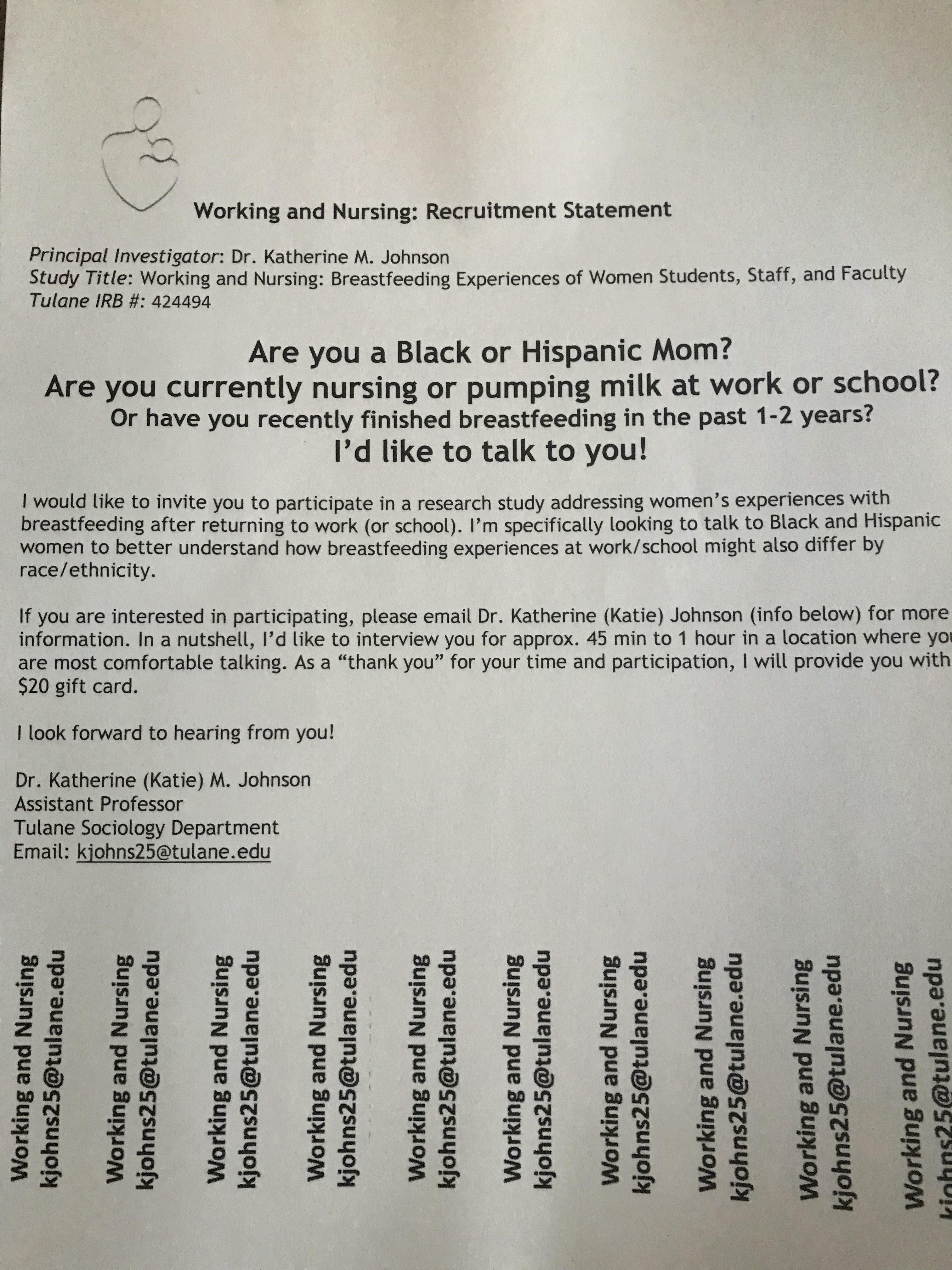Well, the summer has officially begun, and I find myself back in New Orleans to continue the second leg of my research internship with Tulane sociology professor Dr. Katherine Johnson! In the spring, I started working with Prof. Johnson on her “Working and Nursing” qualitative study, which aims to improve workplace policies and practices for breastfeeding/pumping employees in the greater New Orleans area. Mothers who continue working after having a child often face great obstacles in the workplace if they desire to express breast milk as a means of feeding their child: finding the right space and working pump breaks into daily schedules, for instance, are major challenges.

Last semester, the bulk of my work included reviewing transcripts of interviews that Professor Johnson conducted with breastfeeding employees from a range of industries and evaluating lactation spaces available to mothers on Tulane’s uptown and downtown campuses. This summer, I will help recruit and interview a new cohort of working mothers in New Orleans and bring more focus onto the analysis portion of qualitative research.
I’ve spent the first two weeks of this summer quality-checking a previous batch of community interview transcripts and beginning research on Tulane peer institutions’ breastfeeding policies. I find quality-checking genuinely interesting because I love listening to women’s stories. Having voices to go along with reading a transcript makes the job much more engaging! With every interview I listen to, I am totally in awe at how much mothers sacrifice and persevere through daily to balance their career ambitions with family responsibilities. The innovative solutions they find to create that balance, often out of necessity because of our country’s lacking policies for families, remind me that there is such a need for reform. I hope that studies like these can ultimately help impel some policy change. These quality checks are now done, so it’s finally time to recruit some new mothers for the study!
One challenge that Prof. Johnson has encountered is the need for a more accurate demographic representation of the greater New Orleans area in her pool of interviewees. Last semester, we began discussing how we could recruit mothers from more diverse socioeconomic backgrounds, as well as mothers representing the Hispanic, African- and Vietnamese-American communities of New Orleans, which are important racial/ethnic groups in our city. One of my last research tasks in the spring was to begin a strategy guide for doing this. I learned of a handful of local mothers’ groups with a focus on Black women or women of color, state-level programs supporting breastfeeding for low-income moms, and reproductive health figures in the community who themselves are women of color. Our research will not be the most accurate it can be without this crucial element of representation across class and race/ethnicity, so it’s important to me that Prof. Johnson and I are constantly in collaboration on what the best methods will be for bringing these stories into the study. To be able to interview some mothers myself this summer will be an honor and another challenge I greatly look forward to!
Another thing on my mind is that in the fall, I will be applying to law school! It’s a daunting time, but my summer work is a chance to think about how I can relate themes within reproductive justice to a future in law. In the spring, for instance, I learned about workplace compliance issues and federal legislature associated with it, such as the ACA and FMLA and its applications to different types of employees. In examining Tulane’s breastfeeding policies, particularly, I hope in the coming year to learn about workplace compliance laws in relation to breastfeeding and the implications that this legislation can have for families.
I’m so lucky to be working on Prof. Johnson’s study – seeing her passion for working mothers’ reproductive justice, in being able to choose both to work and to feed their child how they desire, has brought up all sorts of questions in me of how policy and culture can function as transformative mechanisms for the betterment of mothers everywhere. There certainly is no shortage of these questions to be studied this summer! I’m grateful to have this space to learn and collaborate with Prof. Johnson yet again. Until next time!
